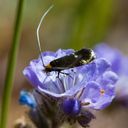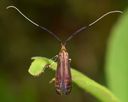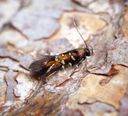Fairy Moths
Adelidae
Classification
- Phylum: Arthropoda
- Subphylum: Hexapoda
- Class: Insecta
- Order: Lepidoptera
- Superfamily: Adeloidea
- Family: Adelidae
Pronunciation
How to pronounce Adelidae: /ˌædɛˈlaɪdiː/
These audio files are automatically generated. While they are not always 100% accurate, they are a good starting point.
Images






Summary
The Adelidae, or fairy longhorn moths, are a family of small, often metallic, diurnal moths characterized by their long antennae. They have a global distribution with many species in North America and are notable for their unique life history and feeding behavior.
Physical Characteristics
Small moths with a wingspan of 4-28 mm; males have long antennae that are 1-3 times the length of their forewings, while females' antennae are 1-2 times longer than their forewings. The basal half of the antennae in females is hairy. Many species exhibit metallic, patterned coloration and are diurnal, while others are crepuscular with drab coloration.
Identification Tips
Look for their long antennae that can be several times the length of their forewings, and note their iridescent and metallic colors in various species.
Habitat
Found in grasslands and openings with forbs & grasses in chaparral, woodlands, or forests, where host plants are nearby.
Distribution
Widespread across much of North America, Eurasia, Neotropics, and sub-Saharan Africa; peak flying season is from April to June.
Diet
Adults feed on nectar from flowers of herbaceous plants as well as trees like willow. Larvae feed on leaf fragments on the ground.
Life Cycle
Adult moths fly from April to June, with larvae developing in cases built from plant material on the ground.
Reproduction
Females insert their eggs in plants or lay them among leaf litter; the larvae develop into caterpillars.
Ecosystem Role
Pollinators as adults feeding on nectar; they also contribute to the breakdown of leaf litter and plant material.
Collecting Methods
- Light traps
- Netting during flight periods
Preservation Methods
- Pinning
- Alcohol preservation for larvae
Evolution
Adelidae are one of the basal lineages of monotrysian moths, showing a primitive morphology akin to early lepidopteran ancestors.
Similar Taxa
Misconceptions
Often mistaken for other small moths due to their size and appearance; their diurnal behavior contrasts with the generally nocturnal habits of many moths.
Tags
- Lepidoptera
- Moths
- Adelidae
- Fairy Moths
- Biodiversity
- Conservation
- Insect Ecology